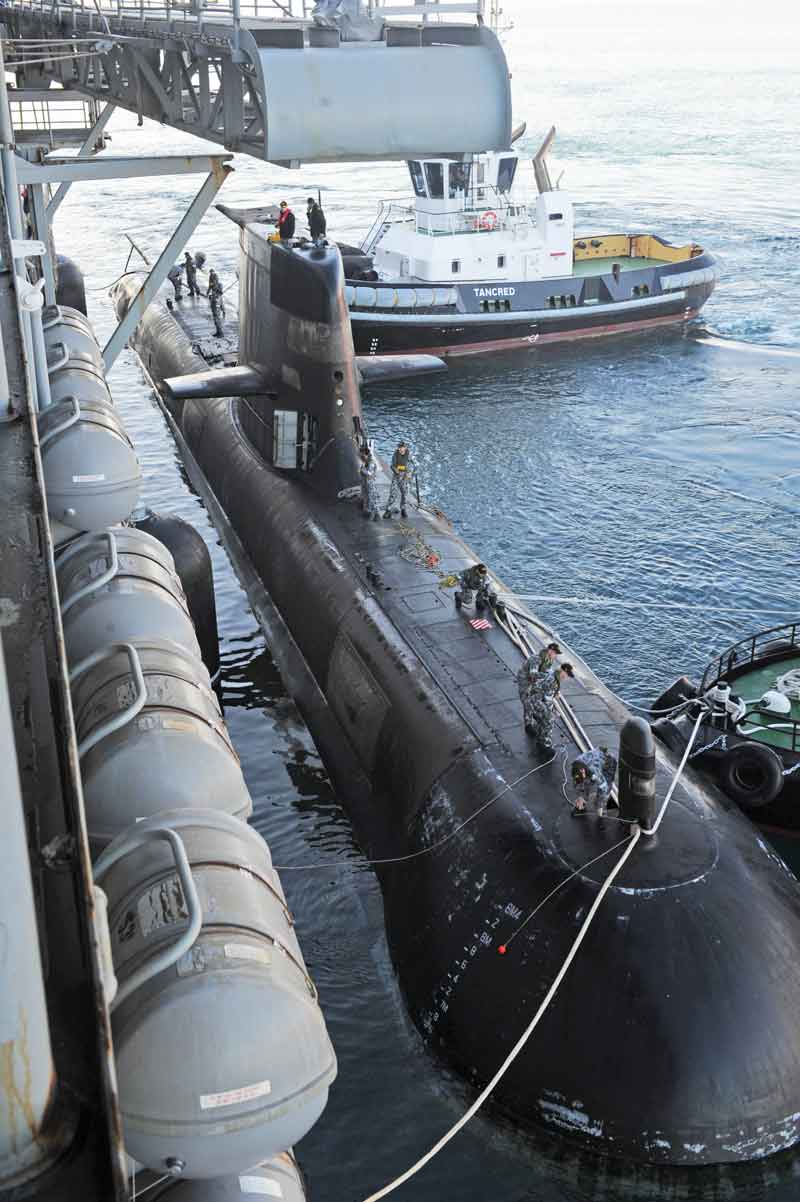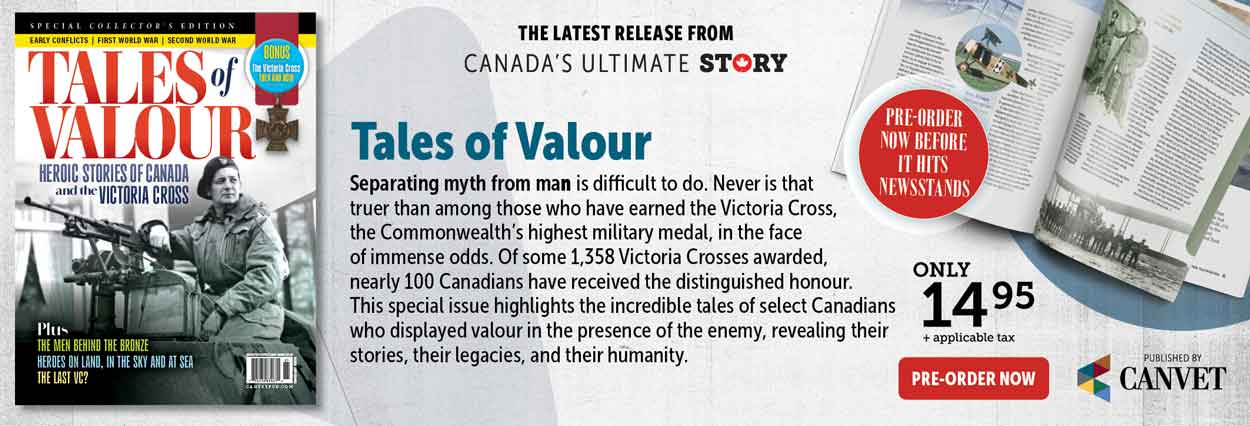
Australian sub Sheean moors alongside a U.S. tender during bilateral training in the Indo-Pacific region in September 2019.[Destiny Reed/U.S. Navy]
David L. Cohen, the U.S. ambassador to Canada, was a lobbyist and Democratic Party fundraiser, and he is, perhaps, less diplomatic than some foreign service officers. In a spring 2022 interview soon after he arrived in Ottawa and shortly after the federal budget promised more funding for the Department of National Defence, the ambassador agreed that it was “fair to say that although $8 billion is more money, it was a little disappointing as matched against the rhetoric that we have heard leading into the release of the budget.”
That was a polite, firm rebuke. It was also accurate.
Indeed, foreign politicians and military officers have long complained about Canada’s defence outlays. In the 1950s, when Canada was spending seven per cent of its gross domestic product (GDP) on defence, the Americans wanted more. In 1963, the commander of NATO forces in Europe pressed hard for Ottawa to get its nuclear weapons operational, a stance that contributed to the downfall of the government of John Diefenbaker. Former U.S. president Donald Trump was critical, too, lumping Canada in with the other NATO members who weren’t spending two per cent of GDP on their militaries.
Most recently, Washington called on Canada to lead a peacekeeping force to restore order in Haiti. The Trudeau government, clearly reluctant to take on new commitments with substantial numbers of troops deployed overseas, waffled and, during U.S. President Joe Biden’s March visit to Ottawa, instead committed $100 million for the Haitian National Police.
Given the personnel shortfall in the Canadian Armed Forces—some 16,000 understrength—a Haitian peacekeeping mission is possibly a commitment that would stretch the military too far, similar to how the deployment to Somalia in the mid-1990s impacted the CAF in the early post-Cold War era.
Well, so what? The United States will defend Canada because it’s in its own national interest. Or so say many Canadians. And it’s likely true up to a point. The Yanks will likely pay the lion’s share of upgrades to Norad’s radars and computers because they need information on possible attacks. Given the rhetoric from some potential adversaries, such information seems essential.
But Canadians need to realize that the country’s willingness to spend $30 billion on $10 universal daycare and some $45 billion on health care each year may not sit very well with U.S. politicians and officials who allocate 3.48 per cent of their country’s GDP (more than $800 billion) on defence. And as Canada continues to dither on spending even close to the NATO two per cent standard (in 2022 it spent an estimated 1.33 per cent), it’s fair to say that the Americans sense the country’s unwillingness to prioritize defence.
Think of recent events. U.S. generals have proclaimed that war with China related to Taiwan might occur by 2025, a conflict that will likely involve Canada militarily, economically and diplomatically. But when Britain, Australia and the U.S. created a new Indo-Pacific defence alliance in September 2021, Canada had not been invited to join. Indeed, the federal government reportedly only learned of the agreement when it was publicly announced.
In truth, Canada had little to contribute to the pact. When the government released its Indo-Pacific Strategy in late 2022, for example, the major addition to Canada’s defence efforts in the region was to increase naval vessel visits from two to three a year. Beijing must have been quaking in its boots…and not surprisingly, the cheering in American defence circles was rather muted.
Canada is also not involved in another defence alliance in the Indo-Pacific, the Quadrilateral Security Dialogue, which includes the U.S., Australia, Japan and India. And before a meeting with then-Australian prime minister Scott Morrison in September 2021, Biden proclaimed that “the United States has no closer or more reliable ally than Australia.” That comment ought to have stung in Ottawa.
Of course, Canada is closer physically to Washington than Australia, but not more dependable, apparently. Canada didn’t send troops to fight in Vietnam nor did it formally participate in the U.S. invasion of Iraq in 2003—Australia did. And today Australia is boosting its defence spending, acquiring nuclear submarines and is direct about its concerns about human rights issues in China. Washington waxes enthusiastically about Canberra’s stance, which is more impressive because it draws support from both the ruling party and the opposition.
Not in Canada, though. Here, the New Democratic Party, which supports the minority government, prioritizes social programs over investment in defence. Meanwhile, the government’s position on China is circumspect: it took three and a half years to decide to block Chinese company Huawei from the country’s communication systems; it has lagged in establishing a foreign agent registry and preventing China from acquiring research from Canadian academics; and it has done little to stop Chinese diplomats from interfering in the country’s federal elections. Again, Washington noticed.
The Biden administration is also strengthening Washington’s “Buy American” requirements. Unless Ottawa can negotiate exemptions for Canadian exporters, that policy will make it difficult for Canadian lumber or steel companies to export their goods for American federal government projects. If Washington pushes the program hard, then Ottawa is certain to retaliate. A trade war with Canada’s most important ally (even if the U.S. doesn’t see Canada that way, too) will be in neither country’s interest.
More investment in defence won’t be a magic bullet for Canada-U.S. trade relations, of course. There are likely always going to be trade disputes or differences on foreign-policy questions. But there can be little doubt that U.S. administrations and its military are fed up with Canada not paying a fair share. Canada is a G7 nation, but its spending on defence is substantially less than that of the other members. Yes, Canada has played a major role in galvanizing support for Ukraine and has speedily acquired equipment for Kyiv. Nonetheless, sending only eight Leopard tanks seemed pathetic.
“The Americans are our best friends,” said former Social Credit Party leader Robert Thompson 60 years ago, “whether we like it or not.” While many Canadians like to ridicule American shortcomings—and anti-Americanism is a favoured Canadian pastime—Canadians need to realize that the world will be a rather unfriendly place if the U.S. gets really frustrated with the country.
Strengthening the CAF would be a good way to rebuild trust.
Advertisement




















